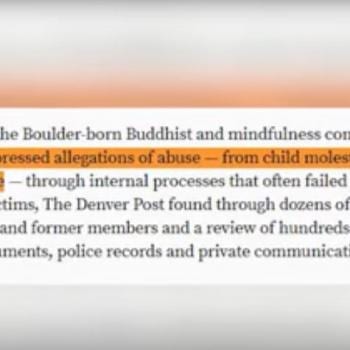Two years ago, 5-year-old Luiz Antonio stole the hearts of many around the world when he refused to eat meat, telling his laughing/weeping mother (translated from Portuguese), “When we eat animals, they die. Why? … I don’t like that they die… These animals … you gotta take care of them … and not eat them.”
And now, another child, this time from Ireland, will melt your heart with her tear-filled explanation to her father, “I don’t like what people eat, animals. I just don’t want them to be chopped up.”
“Pigs are nice. Chickens are nice. Cows are nice,” she continues.
https://www.youtube.com/watch?v=Sl9lDtTOE_U
The place of vegetarianism in Buddhism is often debated. As discussed here: A Buddhist Sutta on the ethics of eating meat, there is no injunction against monks eating meat, so long as it isn’t procured (read: chopped up) specifically for them as far as they know. Likely in line with his pragmatic approach to applied ethics, the Buddha refused to make vegetarianism a rule in his community. Instead he suggested a sort of non-picky-ness, saying that monks and nuns should accept whatever is offered with gratitude.
At the same time, he taught against the efficacy of animal sacrifice, common in his day, and set out the first precept (to be followed by willing lay people as well as monastics) that one should abandon causing harm to living beings. Animals, in Buddhist cosmology, are also seen as not so different from humans insofar as any of them might have been humans in a past life (and in the infinity of time, all beings, it is said, have at one time been our mothers) and we as humans have likely been animals in some past life and could quite possibly be one in a future life.
A famous Dhammapada section reads:
129. All tremble at violence; all fear death. Putting oneself in the place of another, one should not kill nor cause another to kill.
130. All tremble at violence; life is dear to all. Putting oneself in the place of another, one should not kill nor cause another to kill.
131. One who, while himself seeking happiness, oppresses with violence other beings who also desire happiness, will not attain happiness hereafter.
132. One who, while himself seeking happiness, does not oppress with violence other beings who also desire happiness, will find happiness hereafter.
And while some might be quick to note that this says nothing specifically about eating, it should go without saying that the connection is clear enough, even to children.
Here’s little Luiz, for anyone who hasn’t seen him back in 2013:
Further reading:











